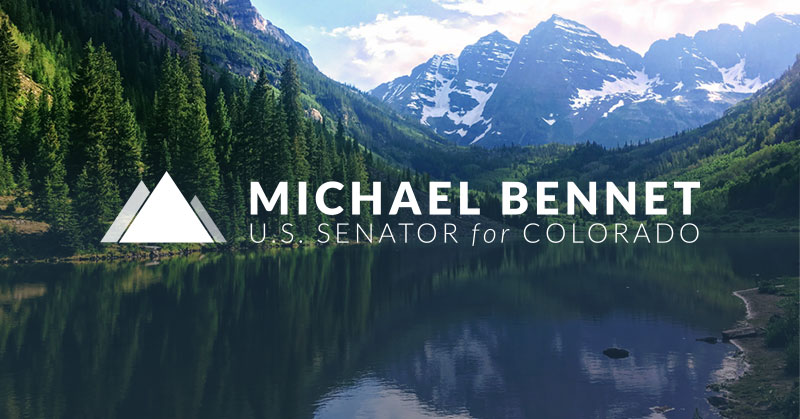Source: United States Senator for Colorado Michael Bennet
Washington, D.C. – Colorado U.S. Senator Michael Bennet urged President Joe Biden to extend the pause on student loan repayment, interest, and collections until December 31, 2022 as the U.S. economy continues to recover from the Coronavirus Disease 2019 (COVID-19) pandemic. In his letter, Bennet also asks President Biden to work with leaders of both parties to develop long-term solutions to the U.S. student loan debt crisis.
“The extension will serve two purposes. First, it will ensure a smooth return to repayment and give student loan borrowers additional time to recover from the economic downturn that the pandemic caused. It will also help borrowers who are struggling with inflation and higher costs associated with postsecondary education, including the cost of child care for student parents,” wrote Bennet. “Second, it will offer time for the Administration to work with leaders in both parties to seek long-term solutions to the root causes of the student debt problem in the United States. As you know, student loan borrowers, especially borrowers of color and first-generation borrowers, are experiencing an unmanageable burden of student loan debt, and historically rapid increases in college tuition.”
According to the Department of Education, about 773,000 Coloradans owe approximately $28.5 billion in federal student loans. Nationwide, the pause on student loan payments has helped 41 million borrowers save $5 billion per month. But as college tuition continues to rise at historic rates, Bennet is urging the president to do more to ease the financial burden many borrowers experience, especially borrowers of color and first-generation borrowers.
Bennet continued: “To this end, the Administration should consider additional proposals to deliver relief to borrowers seeking college degrees and skills training. This could include permanently making most federal student loans interest-free. It could also include making incentives to save for postsecondary education universally available and more flexible, and considering federal seed money or a match for low-income students so they can build accounts that pay college costs, instead of relying heavily on student loans. We should also explore increasing incentives to employers to help pay tuition for workers. Finally, we should continue to work together to increase the maximum Pell Grant award.”
The text of the letter is available HERE and below.
Dear President Biden:
I request that you extend the pause on student loan repayment, interest, and collections to December 31, 2022. The extension will serve two purposes. First, it will ensure a smooth return to repayment and give student loan borrowers additional time to recover from the economic downturn that the pandemic caused. It will also help borrowers who are struggling with inflation and higher costs associated with postsecondary education, including the cost of child care for student parents. Second, it will offer time for the Administration to work with leaders in both parties to seek long-term solutions to the root causes of the student debt problem in the United States. As you know, student loan borrowers, especially borrowers of color and first-generation borrowers, are experiencing an unmanageable burden of student loan debt, and historically rapid increases in college tuition.
According to the Department of Education, as of September 30, 2021, $1.6 trillion in federal student loans, borrowed by or on behalf of approximately 43 million individuals, remained outstanding. Of that amount, about 773,000 Coloradans owe approximately $28.5 billion in federal student loans. A recent report from The Institute for College Access and Success (TICAS), found “even before the pandemic, too many student loan borrowers were struggling to repay their debt, and if COVID-19 emergency federal benefits end in early 2022, many borrowers may still be facing pandemic-related economic hardship.”
We must do all that we can to ease the financial burden of student loan debt for borrowers who took out loans to pay for college. An increasing number of borrowers are struggling with high student loan debt instead of buying a home, having children, and starting businesses. The Administration should use this opportunity to help borrowers ease back into repayment and work with Congress to make systematic changes in the way college students pay for postsecondary education.
While the pause on student loan payments has helped 41 million borrowers save $5 billion per month, we still must address the long-term problem of student loan debt that burdens millions of low-income and first-generation borrowers. In addition, we must also create incentives to reduce the already-high and steadily increasing cost of postsecondary education.
To this end, the Administration should consider additional proposals to deliver relief to borrowers seeking college degrees and skills training. This could include permanently making most federal student loans interest-free. It could also include making incentives to save for postsecondary education universally available and more flexible, and considering federal seed money or a match for low-income students so they can build accounts that pay college costs, instead of relying heavily on student loans. We should also explore increasing incentives to employers to help pay tuition for workers. Finally, we should continue to work together to increase the maximum Pell Grant award.
Addressing the root causes of America’s problem with student loan debt will be hard work. I look forward to working with you and the Administration to develop bipartisan proposals designed to help student loan borrowers.
Sincerely,
